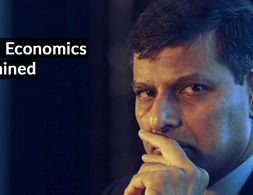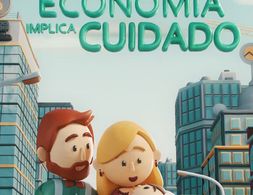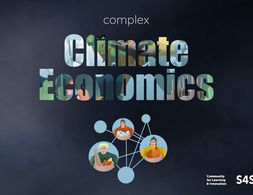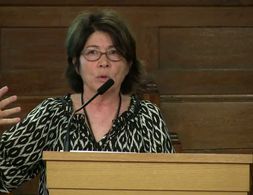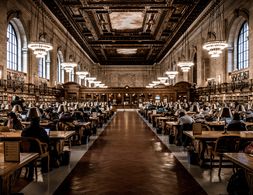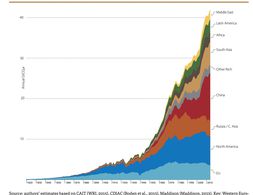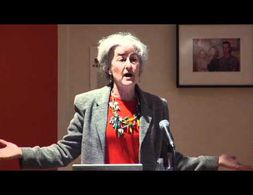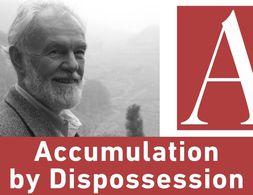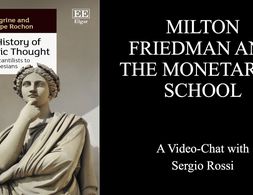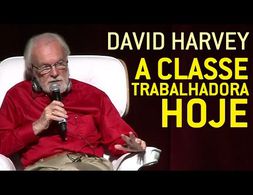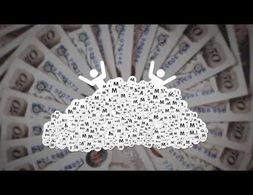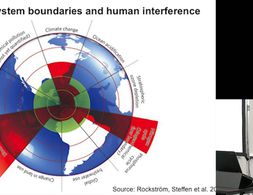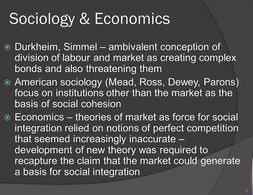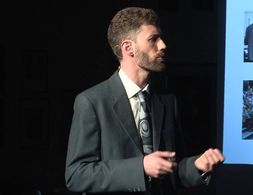✕
1198 results
In this short video 'Raghuram Rajan’s Dosa Economics Explained', the famous theory of Dr. Raghuram Rajan, ex-governor of Reserve Bank of India (RBI), Dosa Economics, has been explained using a very simple example of Dosa ( a delicacy of India). Here, Dr. Raghuram Rajan tries to explain that low interest rate and low inflation is much better than high interest rate and high inflation.
This course introduces the main topics in Econometrics by using R statistical software. The relation of themes is comprehensive and includes the basic notions such as linear regression, multiple regression, causal inference, regression discontinuity and instrumental variable. In total, the course covers thirteen chapters that are common in any undergraduate econometrics course.
Se trata de un cortometraje que cuestiona el estado actual de la economía presentando ideas que hacen pensar, además de mirar el pasado para explicar cómo se formó el concepto actual de la economía.
Can pluralism in economics be useful to tackle the fight against climate change? How can a diversity in methods and ideas allow for a better understanding of the issue of the climate crisis? What solutions do different schools of thought offer to overcome the most pressing challenge of the 21st Century? Our Rethinker Henrika Meyer will give you some answers and give you a glimpse of the solutions pluralism offers to tackle the fight against climate change.
Can pluralism in economics be useful to tackle the fight against climate change? How can diversity in methods and ideas allow for a better understanding of the issue of the climate crisis? What solutions do different schools of thought offer to overcome the most pressing challenge of the 21st Century? Our Rethinker Henrika Meyer will give you some answers and give you a glimpse of the solutions pluralism offers to tackle the fight against climate change.
A multimedia dossier outlining the relevance and the history of the shipping container for global trade and supply chains.
"Learn why cities are key in resolving global urbanization and sustainability challenges and how you can engineer tomorrow’s cities today."
At the 2013 Climate, Mind, & Behavior Symposium, Rebecca Adamson of First Peoples Worldwide illustrates alternative economic systems modeled after indigenous worldviews and the power they have in pushing us towards a more sustainable existence.
In this blog article Steve Keen elaborates on flawed climate change modelling and mainstream economics forecasts. In specific, he stresses the climate change forecasts of the DICE model (“Dynamic Integrated model of Climate and the Economy”) by Nobel Memorial Prize in Economic Sciences winner William Nordhaus.
A pithy, stimulating debate between three great economists on the heterogeneous character of economic thought
The British historian, Adam Tooze, highlights how the climate crisis is not just an environmental or ecological problem but also a political economy challenge.
In 18th century Europe figures such as Adam Smith, David Ricardo, Friedrich List and Jean Baptiste Colbert developed theories regarding international trade, which either embraced free trade seeing it as a positive sum game or recommended more cautious and strategic approaches to trade seeing it as a potential danger and a rivalry and often as a zero-sum game. What about today?
Feminist economist Nancy Folbre presents a historical analysis of the interrelated development of Patriarchy and Capitalism. She describes the role of women in the reproduction of labour, their “specialization” in care and their changing involvement in the labour market. Folbre argues that capitalism weakens patriarchy but at the same time relies on unpaid caring activities.
In this short lecture the marxist economic geographer David Harvey explains how his theory of The accumulation of dispossession came about and its central principles The theory builds on Marx law of the centralisation of capital arguing how the accumulation no longer stems from producing rather through trading asset values …
To celebrate the forthcoming book A brief history of Economic Thought From the Mercantilists to the Post Keynesians edited by Louis Philippe Rochon and Hassan Bougrine Edward Elgar Louis Philippe Rochon sat down with celebrated author and scholar Sergio Rossi to discuss his contribution Milton Friedman and the Monetarist School …
The most influential and controversial economist of the twentieth century, John Maynard Keynes was the leading founder of modern macroeconomics, and was also an important historical figure as a critic of the Versailles Peace Treaty after World War I and an architect of the Bretton Woods international monetary system after World War II.
What is the working class under present circumstances and in particular in urban lives? David Harvey explains how the concept of the working class is still suitable for the current organization of work – even if working conditions changed, now being more service-oriented and diffused. Harvey further discusses how this diffused working class can organize via urban neighbourhoods.
Michael Kalecki famously remarked “I have found out what economics is; it is the science of confusing stocks with flows”. Stock-Flow Consistent (SFC) models were developed precisely to address this kind of confusion. The basic intuition of SFC models is that the economy is built up as a set of intersecting balance sheets, where transactions between entities are called flows and the value of the assets/liabilities they hold are called stocks. Wages are a flow; bank deposits are a stock, and confusing the two directly is a category error. In this edition of the pluralist showcase I will first describe the logic of SFC models – which is worth exploring in depth – before discussing empirical calibration and applications of the models. Warning that there is a little more maths in this post than usual (i.e. some), but you should be able to skip those parts and still easily get the picture.
Ob Klima-Migration ein Sicherheitsrisiko oder eine Chance darstellt, liegt in den Händen der Politik
Der Klimawandel dürfte die globalen Migrationsbewegungen in den kommenden Jahren deutlich verstärken – was die Politik gleich an mehreren Fronten unter Handlungsdruck setzt.
What is money and how does it work? The short film reveals common misunderstandings of where money comes from, explains how money is created by banks and presents consequences of money as credit. The video is part of the campaign positive money, promoting the democratic control over money creation.
In the keynote speech, Sigrid Stagl argues why it is necessary to include socio-ecological aspects in macoreconomic models. The talk focuses on the ecological necessities, mentioning limits to growth, resource extraction and planetary boundaries. At the end, Stagl shortly presents several current macroeconomic initiatives and models that move towards a a socio-ecological macroeconomics.
With this calculator you can assess the ecological backpack of your lifestyle. The ecological backpack visualizes the weight of all natural raw materials that are needed for our private consumption behavior. This includes all products and their production, use, and disposal.
In this short talk, Nicole Pepperell discusses Albert Hirschman's book "Rival Views of Market Society and Other Recent Essays". Among others, he discusses different conceptions of the characteristics and dynamics of capitalist societies.
Der Kurs richtet sich an Interessierte, die einen Überblick über gängige Modellierungsansätze in der Makroökonomik erhalten wollen. Dabei habe ich versucht, Ansätze aus unterschiedlichen Paradigmen zu berücksichtigen, notwendigerweise auf Kosten einer gewissen Tiefe bei den einzelnen Modellierungsframeworks. Der Kurs setzt ein gewisses mathematisches Grundverständnis voraus, sollte aber für fortgeschrittene Bachelor-Studierende der Ökonomik und Master-Studierende von interdisziplinären Studienprogrammen gut geeignet sein. Die Themenauswahl ist natürlich notwendigerweise selektiv. Der erste, größere Abschnitt diskutiert Modelle für wirtschaftlichen Wandel in der langen Frist (Wachstumsmodelle). Der zweite, kürzere Abschnitte behandelt dann Modelle, welche versuchen eine langfristige mit einer kurzfristigen Perspektive zu verbinden.
In this TedTalk Dan O Neil explains why GDP and infinite growth are concepts that we should leave behind and which other perspectives have been developed Degrowth post growth well being or steady state economy The goal is to rethink a new paradigm that puts society and the environment at …
The most successful multialternative theories of decision making assume that people consider individual aspects of a choice and proceed via a process of elimination. Amos Tversky was one of the pioneers of this field, but modern decision theorists – most notably Neil Stewart – have moved things forward. At the current stage the theories are able to explain a number of strictly ‘irrational’ but reasonable quirks of human decision making, including various heuristics and biases. Not only this, but eye movements of participants strongly imply that the decision-making process depicted in the theories is an accurate one.
The author discusses the various dimensions of the recent hike in inflation in the context of the United States and policy dilemmas around high inflation GDP decline and unemployment Servaas Storm Institute for New Economic Thinking
Ever wondered why some countries are rich and others poor Or why some people believe hard work results in upward mobility and others don t To answer these questions you need to see the world sociologically In this introductory sociology course we will explore the concerns of an interconnected global …
This video explains what the term 'Feminist Economics' describes and goes into detail on how feminist economists use methodology differently, why they advocate for diversity in research and how to look into preconditions for the functioning of our economies. It, additionally, highlights the link between feminist economics and the study of climate change.
The world of economics is changing. Years of turmoil in the global economy mean that nothing will ever be quite the same again. This is the starting point and theme of this radically revised Economist books classic.
With a focus on Chile, Pinochet’s Economic Accomplices: An Unequal Country byForce uses theoretical arguments and empirical studies to argue that focusing onthe behavior of economic actors of the dictatorship is crucial to achieve basic objectivesin terms of justice, memory, reparation, and non-repetition measures.
Adam Smith and Karl Marx recognized that the best way to understand the economy is to study the most advanced practice of production. Today that practice is no longer conventional manufacturing: it is the radically innovative vanguard known as the knowledge economy.
Necesitamos cookies. Pincha en “Aceptar” para ayudarnos a hacer de Exploring Economics una mejor plataforma.

